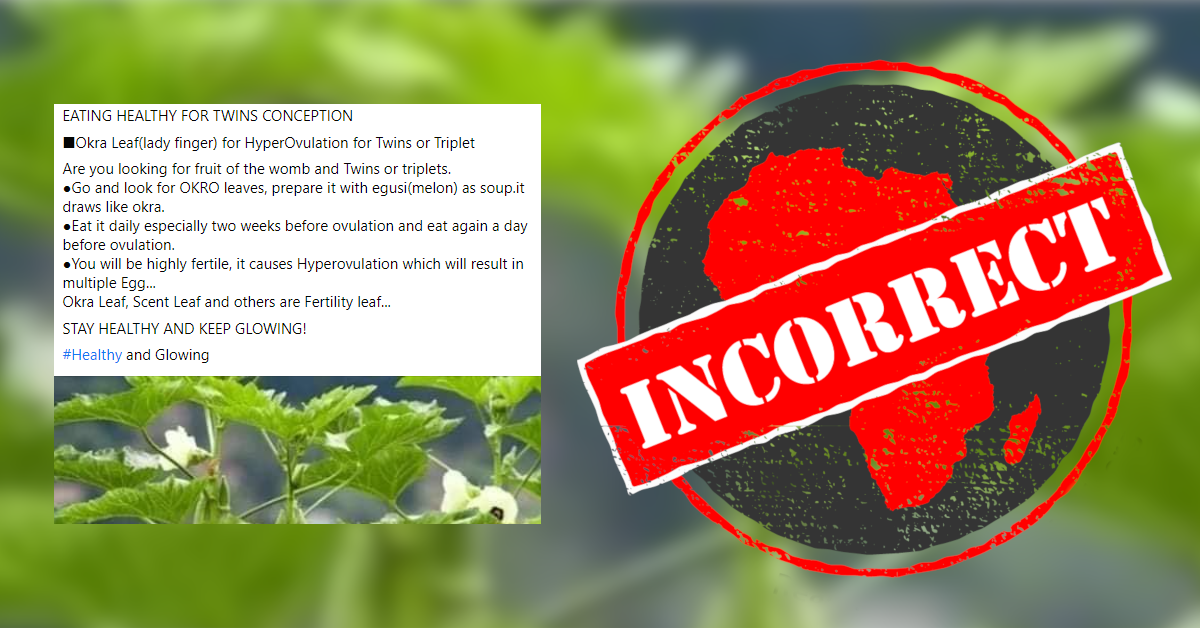“Okra Leaf (lady finger) for Hyper Ovulation for Twins or Triplet,” claims a Facebook post shared in Nigeria in September 2020.
The post gives encouraging details for women struggling to conceive.
“Are you looking for fruit of the womb and twins or triplets?” it asks. “Go and look for OKRO leaves, prepare it with egusi (melon) as soup. It draws like okra. Eat it daily especially two weeks before ovulation and eat again a day before ovulation.
“You will be highly fertile, it causes Hyperovulation which will result in multiple Egg … Okra Leaf, Scent Leaf and others are Fertility leaf … STAY HEALTHY AND KEEP GLOWING!”
Okra, also known as ladies' fingers or by the botanical name Abelmoschus esculentus, is a herbaceous hairy annual plant of the mallow family. Its edible green seed pods are particularly valued, though the whole plant can be eaten. But will its leaves help with a woman’s fertility?

“I have never come across any research on okra and fertility,” Dr Abdulkarim Garba Mairiga, a professor of reproductive health at the department of obstetrics and gynaecology at the University of Maiduguri in northeastern Nigeria, told Africa Check.
“It hasn’t been scientifically proven. Okra does not affect a woman’s reproductive health. I would advise women to disregard the claim. There are fertility drugs doctors prescribe which stimulates a woman to get pregnant,” Mairiga said.
“Women shouldn’t rely on okra. If it worked, Nigeria wouldn’t be having any cases of infertility because okra is widely consumed.”
Adetunji Adeniji, a professor of obstetrics and gynaecology at Ladoke Akintola University of Technology in Oyo state in southwestern Nigeria, also told Africa Check there is no scientific proof to back up the claim about okra and women should disregard it.
“Unless a woman is going for artificial reproductive technique, there is nothing that can influence single or even multiple pregnancies. There are also reports that a particular tribe in south-west Nigeria is known for twinning because of a type of food consumed. But that is not recommended. There is nothing definite about twin pregnancy, though a woman is more likely to have twins if her mother or someone in her lineage had twins.”
Africa Check also found no scientific research reporting a correlation between eating okra and increased ovulation in women, or an increased probability of conceiving twins. – Motunrayo Joel
The post gives encouraging details for women struggling to conceive.
“Are you looking for fruit of the womb and twins or triplets?” it asks. “Go and look for OKRO leaves, prepare it with egusi (melon) as soup. It draws like okra. Eat it daily especially two weeks before ovulation and eat again a day before ovulation.
“You will be highly fertile, it causes Hyperovulation which will result in multiple Egg … Okra Leaf, Scent Leaf and others are Fertility leaf … STAY HEALTHY AND KEEP GLOWING!”
Okra, also known as ladies' fingers or by the botanical name Abelmoschus esculentus, is a herbaceous hairy annual plant of the mallow family. Its edible green seed pods are particularly valued, though the whole plant can be eaten. But will its leaves help with a woman’s fertility?

Not scientifically proven
“I have never come across any research on okra and fertility,” Dr Abdulkarim Garba Mairiga, a professor of reproductive health at the department of obstetrics and gynaecology at the University of Maiduguri in northeastern Nigeria, told Africa Check.
“It hasn’t been scientifically proven. Okra does not affect a woman’s reproductive health. I would advise women to disregard the claim. There are fertility drugs doctors prescribe which stimulates a woman to get pregnant,” Mairiga said.
“Women shouldn’t rely on okra. If it worked, Nigeria wouldn’t be having any cases of infertility because okra is widely consumed.”
Adetunji Adeniji, a professor of obstetrics and gynaecology at Ladoke Akintola University of Technology in Oyo state in southwestern Nigeria, also told Africa Check there is no scientific proof to back up the claim about okra and women should disregard it.
“Unless a woman is going for artificial reproductive technique, there is nothing that can influence single or even multiple pregnancies. There are also reports that a particular tribe in south-west Nigeria is known for twinning because of a type of food consumed. But that is not recommended. There is nothing definite about twin pregnancy, though a woman is more likely to have twins if her mother or someone in her lineage had twins.”
Africa Check also found no scientific research reporting a correlation between eating okra and increased ovulation in women, or an increased probability of conceiving twins. – Motunrayo Joel
Republish our content for free
For publishers: what to do if your post is rated false
A fact-checker has rated your Facebook or Instagram post as “false”, “altered”, “partly false” or “missing context”. This could have serious consequences. What do you do?
Click on our guide for the steps you should follow.
Publishers guideAfrica Check teams up with Facebook
Africa Check is a partner in Meta's third-party fact-checking programme to help stop the spread of false information on social media.
The content we rate as “false” will be downgraded on Facebook and Instagram. This means fewer people will see it.
You can also help identify false information on Facebook. This guide explains how.





Add new comment